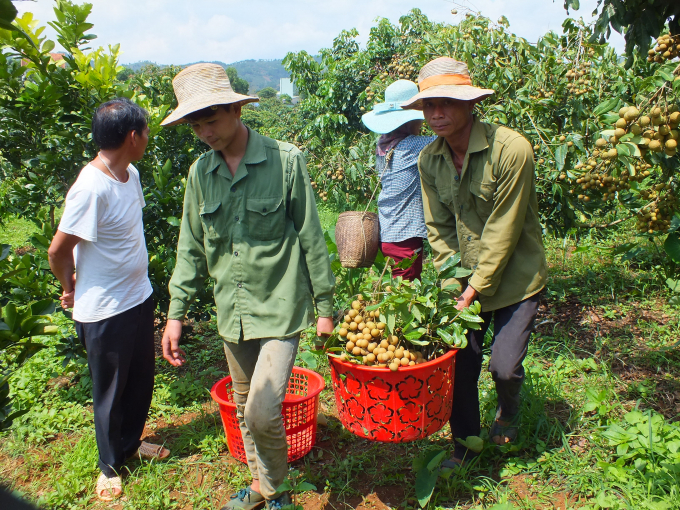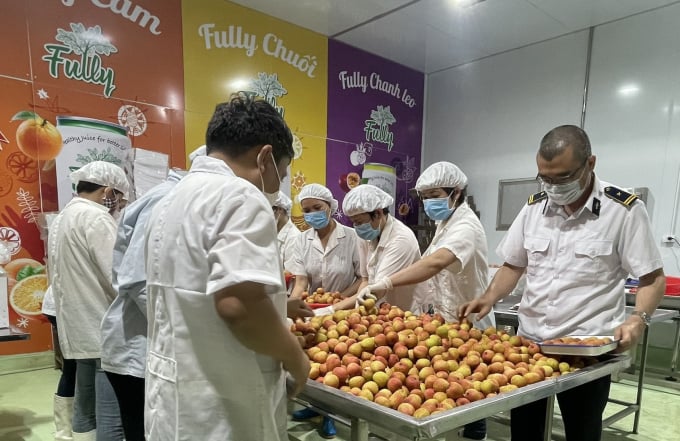June 8, 2025 | 13:23 GMT +7
June 8, 2025 | 13:23 GMT +7
Hotline: 0913.378.918
June 8, 2025 | 13:23 GMT +7
Hotline: 0913.378.918
Deputy Minister of Agriculture and Rural Development Le Quoc Doanh on July 23 worked with leaders of the ministry’s agencies to review agriculture production and difficulties in consumption and exports of several agricultural products during the COVID-19 pandemic.
According to the Crop Production Department, many localities across Vietnam are entering the peak harvest time of fruits.
Southern provinces expect to have a longan production of about 120,000 tonnes. On average, about 20,000 tonnes of longan need to be consumed monthly.

The northern province of Son La expects to harvest nearly 100,000 tonnes longan next month. Photo: LB.
In the first half of this year, provinces in the south produced about 330,000 tonnes of mango. It is estimated that in the second half of this year, they need to consume about 240,000 tonnes or about 41,000 tonnes per month.
Mekong Delta provinces will harvest about 580,000 tonnes of dragon fruit in the coming time, about 48,000 tonnes of dragon fruits need to be consumed monthly.
Meanwhile, northern provinces expect to get a mango production of about 115,000 tonnes, ten per cent higher than that of last year. Until now, almost all mango in the northern provinces were harvested and consumed.
Provinces in the north would enter peak harvest time for longan in the next few weeks with an estimated production of about 300,000 tonnes, an increase of 13 per cent compared with that of last year.
The northern province of Sơn La reported its mango production of about 65,000 tonnes and its longan production of nearly 100,000 tonnes.
Next month, northern provinces also expect to harvest about 120,000 tonnes of custard apple.
According to Deputy head of Crop Production Department Le Van Duc, only 25 per cent of summer-autumn rice in Mekong Delta province were harvested. In locked-down areas, farmers need assistance to harvest rice.
Militia and armed forces could help farmers harvest rice, he suggested.
Hoang Trung, head of the ministry’s Plant Protection Department said that Vietnam's fruit exports remained good.
The country has exported about one million tonnes of dragon fruit this year and more than 500,000 tonnes of mango – the same volume export of last year.

Localities, particularly locked-down ones faced difficulties in implementing plant quarantine for exported farming products. Photo: LB.
The Plant Protection Department asked plant quarantine offices to ensure the quarantine and the granting quarantine certificates for agricultural products, especially fruits during the pandemic.
However, localities, particularly locked-down ones faced difficulties in implementing plant quarantine for exported farming products.
Quarantine officers could not reach enterprises to examine products as even vaccinated officers had to show COVID-19 negative certificates to enter locked-down areas. Moreover, the certificates are valid only for three days.
Trung said that instead of examining exported products at the exporters’ facilities, the plant protection department arranged staff to work at ports in HCM City. Exporting enterprises in COVID-19-hit areas would send batches of exported products to HCM City’s ports.
Some plant quarantine offices were suspended after their staff reportedly had close contact with confirmed COVID-19 cases.
In other cases, the quarantine for imported products also faced difficulties. For example, Vietnamese quarantine officers could not examine products imported from Indonesia as the crew on the ship that carried those products were tested positive for SARS-CoV-2.
COVID-19 vaccination for quarantine officers need to speed up, he said.
In addition, in locked-down areas, farmers were not allowed to go to work in fields. The plant protection officers were either. As a result, the crop disease forecast and warning also faced difficulties, Trung said.
Deputy Minister of Agriculture and Rural Development Le Quoc Doanh said that the country's agricultural production and exports remained relatively good.
However, in southern provinces, the farming product consumption was affected due to the complicated development of COVID-19.
The consumption of lychee and mango in northern provinces in the last few months brought good experience for farming product consumption during the pandemic.
Localities, ministries and agencies must be all active and ready in responding to the development of the COVID-19 pandemic with a detailed scenario.
Doanh asked relevant agencies to follow developments of the pandemic and markets closely. So they could timely make forecasts, plans and scenarios for farming products.
Despite the pandemic, the negotiations for Vietnamese farming products to access markets must be continued, particularly to China and Japan.

(VAN) VAAS and numerous Vietnamese enterprises have signed cooperation agreements with Japanese partners to promote agricultural technology and trade connectivity.
/2025/05/29/5625-12-214801_567.jpg)
(VAN) Provincial mergers in the Mekong Delta promise to streamline administration, expand inter-provincial raw material areas, and foster close linkages in agricultural value chains, benefiting both businesses and cooperatives.

(VAN) Merging Mekong Delta provinces contributes to the expansion of agricultural raw material areas, addressing previous constraints caused by provincial boundaries. Additionally, this expansion will reduce costs and strengthen linkages between businesses, cooperatives, and farmers.
/2025/05/29/1043-2-153730_145.jpg)
(VAN) The Government's policy to merge provincial-level administrative units opens up major opportunities for the Mekong Delta region to reshape its agricultural development strategy toward large-scale production, effective regional linkages, and sustainability.

(VAN) The mutual export of agrifood products between the European Union (EU) and the United Kingdom (UK) must occur again without certification, border controls or other red tape. This was agreed at the UK-EU summit.
/2025/05/22/5121-2-173645_677.jpg)
(VAN) NBSAP Tracker identifies strengths and areas for improvement in the National Biodiversity Strategy, based on each region’s priorities and capacities.

(VAN) The draft amendment to the Circular on rice export trading stipulates a periodic reporting regime for rice exporting enterprises.